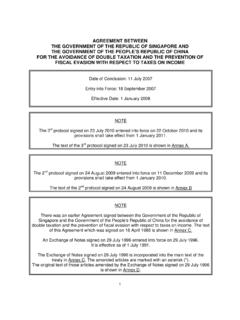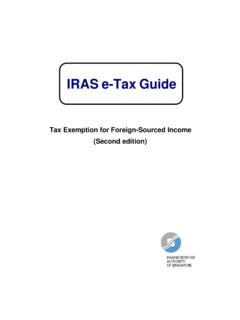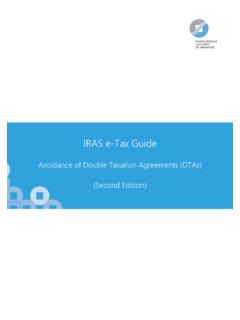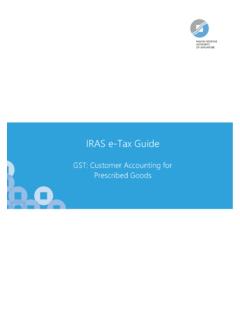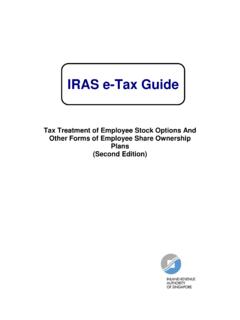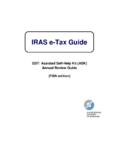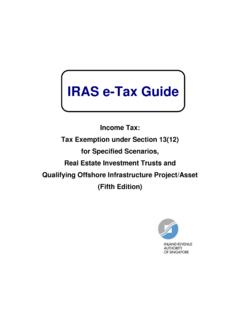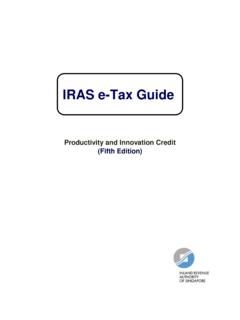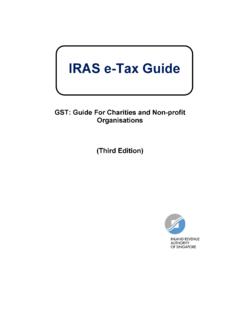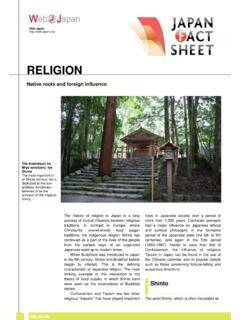Transcription of AGREEMENT BETWEEN THE GOVERNMENT OF THE …
1 AGREEMENT BETWEEN THE GOVERNMENT OF THE REPUBLIC OF SINGAPORE AND THE GOVERNMENT OF japan FOR THE AVOIDANCE OF DOUBLE TAXATION AND THE PREVENTION OF FISCAL EVASION WITH RESPECT TO TAXES ON INCOME Date of Conclusion: 9 April 1994. Entry into Force: 28 April 1995. Effective Date: 1 January 1996. NOTE A Protocol which was signed on 4 February 2010 entered into force on 14 July 2010 and its provisions shall take effect from 14 July 2010. The text of this Protocol signed on 4 February 2010 is shown in Annex A. NOTE There were two earlier Conventions signed BETWEEN the GOVERNMENT of the Republic of Singapore and the GOVERNMENT of japan for the avoidance of double taxation and the prevention of fiscal evasion with respect to taxes on income.
2 The second Convention was signed on 29 January 1971 and amended by the Protocol and Exchange of Notes both signed on 14 January 1981. The text of this Convention is shown in Annex B and the text of the Protocol and the Exchange of Notes amending this Convention are both shown in Annex C. The text of the first Convention which was signed on 11 April 1961is shown in Annex D. The GOVERNMENT of the Republic of Singapore and the GOVERNMENT of japan , Desiring to conclude an AGREEMENT for the avoidance of double taxation and the prevention of fiscal evasion with respect to taxes on income, Have agreed as follows: ARTICLE 1 This AGREEMENT shall apply to persons who are residents of one or both of the Contracting States.
3 1 ARTICLE 2 1. This AGREEMENT shall apply to the following taxes: (a) in japan : (i) the income tax; (ii) the corporation tax; and (iii) the local inhabitant taxes (hereinafter referred to as "Japanese tax"); (b) in Singapore: the income tax (hereinafter referred to as "Singapore tax"). 2. This AGREEMENT shall also apply to any identical or substantially similar taxes, whether national or local, which are imposed after the date of signature of this AGREEMENT in addition to, or in place of, those referred to in paragraph 1. The competent authorities of the Contracting States shall notify each other of any substantial changes which have been made in their respective taxation laws within a reasonable period of time after such changes.
4 ARTICLE 3 1. For the purposes of this AGREEMENT , unless the context otherwise requires: (a) the term " japan ", when used in a geographical sense, means all the territory of japan , including its territorial sea, in which the laws relating to Japanese tax are in force, and all the area beyond its territorial sea, including the sea-bed and subsoil thereof, over which japan has jurisdiction in accordance with international law and in which the laws relating to Japanese tax are in force; (b) the term "Singapore" means the Republic of Singapore; (c) the terms "a Contracting State" and "the other Contracting State" mean Singapore or japan , as the context requires; (d) the term "tax" means Singapore tax or Japanese tax, as the context requires; (e) the term "person" includes an individual, a company and any other body of persons; (f) the term "company" means any body corporate or any entity which is treated as a body corporate for tax purposes; (g) the terms "enterprise of a Contracting State" and "enterprise of the other Contracting State" mean respectively an enterprise carried on by a resident of a Contracting State and an enterprise carried on by a resident of the other Contracting State.
5 2 (h) the term "nationals" means all individuals possessing the nationality of either Contracting State and all juridical persons created or organized under the laws of that Contracting State and all organizations without juridical personality treated for the purposes of tax of that Contracting State as juridical persons created or organized under the laws of that Contracting State; (i) the term "international traffic" means any transport by a ship or aircraft operated by an enterprise of a Contracting State, except when the ship or aircraft is operated solely BETWEEN places in the other Contracting State; and (j) the term "competent authority" means: (i) in the case of japan , the Minister of Finance or his authorized representative; (ii) in the case of Singapore, the Minister for Finance or his authorized representative.
6 2. As regards the application of this AGREEMENT by a Contracting State, any term not defined therein shall, unless the context otherwise requires, have the meaning which it has under the laws of that Contracting State concerning the taxes to which this AGREEMENT applies. ARTICLE 4 1. For the purposes of this AGREEMENT , the term "resident of a Contracting State" means any person who, under the laws of that Contracting State, is liable to tax therein by reason of his domicile, residence, place of head or main office, place of control and management, or any other criterion of a similar nature. 2. Where by reason of the provisions of paragraph 1 an individual is a resident of both Contracting States, then this case shall be determined in accordance with the following rules: (a) he shall be deemed to be a resident of the Contracting State with which his personal and economic relations are closest (centre of vital interests); (b) if the Contracting State in which he has his centre of vital interests cannot be determined, he shall be deemed to be a resident of the Contracting State in which he has an habitual abode.
7 (c) if he has an habitual abode in both Contracting States or in neither of them, he shall be deemed to be a resident of the Contracting State of which he is a national; (d) if he is a national of both Contracting States or neither of them, the competent authorities of the Contracting States shall settle the question by mutual AGREEMENT . 3. Where by reason of the provisions of paragraph 1 a person other than an individual is a resident of both Contracting States, then the competent authorities of the Contracting 3 States shall determine by mutual AGREEMENT the Contracting State of which that person shall be deemed to be a resident for the purposes of this AGREEMENT . ARTICLE 5 1.
8 For the purposes of this AGREEMENT , the term "permanent establishment" means a fixed place of business through which the business of an enterprise is wholly or partly carried on. 2. The term "permanent establishment" includes especially: (a) a place of management; (b) a branch; (c) an office; (d) a factory; (e) a workshop; and (f) a mine, an oil or gas well, a quarry or any other place of extraction of natural resources. 3. A building site, a construction or installation project or supervisory activities in connection therewith, constitute a permanent establishment only if such site, project or activities last more than six months.
9 4. Notwithstanding the provisions of the preceding paragraphs of this Article, the term "permanent establishment" shall be deemed not to include: (a) the use of facilities solely for the purpose of storage, display or delivery of goods or merchandise belonging to the enterprise; (b) the maintenance of a stock of goods or merchandise belonging to the enterprise solely for the purpose of storage, display or delivery; (c) the maintenance of a stock of goods or merchandise belonging to the enterprise solely for the purpose of processing by another enterprise; (d) the maintenance of a fixed place of business solely for the purpose of purchasing goods or merchandise or of collecting information, for the enterprise; (e) the maintenance of a fixed place of business solely for the purpose of carrying on, for the enterprise, any other activity of a preparatory or auxiliary character; and (f) the maintenance of a fixed place of business solely for any combination of activities mentioned in sub-paragraphs (a) to (e), provided that the overall activity of the fixed place of business resulting from this combination is of a preparatory or auxiliary character.
10 5. Notwithstanding the provisions of paragraphs 1 and 2, where a person - other than an agent of an independent status to whom the provisions of paragraph 6 apply - is acting on 4behalf of an enterprise and has, and habitually exercises, in a Contracting State an authority to conclude contracts in the name of the enterprise, that enterprise shall be deemed to have a permanent establishment in that Contracting State in respect of any activities which that person undertakes for the enterprise, unless the activities of such person are limited to those mentioned in paragraph 4 which, if exercised through a fixed place of business, would not make this fixed place of business a permanent establishment under the provisions of that paragraph.
